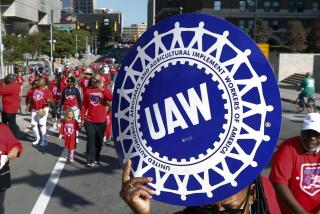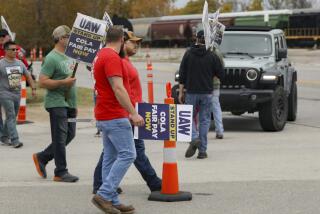5 Banks Set to Help in UAL Buyout, Unions Say : Transportation: Each bank is willing to put up $500 million, but the unions are still far short of the $4.4 billion needed.
- Share via
NEW YORK — In an important but not conclusive development in the effort by UAL Corp.’s unions to buy the airline company, five big American banks were reported Monday to be interested in providing $500 million each in financing for the proposed $4.4-billion buyout.
If the deal goes through, it would make UAL, which is the parent of United Airlines, the largest employee-owned company in the nation. UAL’s present shareholders would receive $201 per common share, according to the terms announced April 6.
The unions have agreed with the company’s directors to come up with “commitments” or “reasonable assurances” of the financing by Aug. 9. If they are successful, the buyout group, called the United Employee Acquisition Group, will have another four months to close the deal.
The interest by the five banks was confirmed by Steven Matthews, a spokesman for the union group.
“I can confirm that the banks have expressed a willingness to work with our group,” Matthews said. “I can confirm that the figure discussed with them is $500 million apiece and that the discussions have revolved around making them (the banks) co-lead managers of the deal.”
He said the banks may bring others throughout the world into a giant syndicate that would provide most of the financing needed.
The banks that have expressed interest are Citicorp, Chase Manhattan Corp., Bankers Trust Co., Manufacturers Hanover Corp. and Chemical Bank Corp., all headquartered in New York.
UAL stock surged Monday on the New York Stock Exchange, closing at $157.125 a share, up $4.375.
But despite the new development, financing the deal remains difficult.
“This is not a done deal by any means,” said one person closely connected with the Air Line Pilots Assn. “It is just one brick in the wall.” ALPA is working with United’s machinists and flight attendants unions in the buyout effort.
Some analysts were even more pessimistic. It was only last October, they noted, that a proposed $6.8-billion management-pilot buyout offer for UAL fell apart when the buyout group failed to find financing.
“This the bare minimum in terms of progress that I would have expected by this time. They only have a month to go.” said Edward J. Starkman, airline analyst with New York’s Paine Webber brokerage firm. “There is nothing now that makes me any more confident or less confident that a deal will be done.”
One problem, some sources said, is that banks might not be willing to provide financing if the transaction does not have at least one outside equity investor. Banks generally like to see someone else assume some of the risk in a deal before they put up any money. In the buyout attempt that failed last fall, British Airways planned to be an equity investor.
The buyout group is talking to a number of United’s airliner and engine suppliers to encourage them to take such an equity position in the reconstituted company. The request for such investment by the suppliers came from Gerald Greenwald, the former Chrysler Corp. executive who was recently hired as chairman of the acquisition corporation and who would head the company if the buyout succeeds.
Greenwald is understood to have asked the chief executives of six major airframe and engine manufacturers last month to provide $250 million each in financing--in return for UAL preferred stock--if the companies win the competitions to provide United’s next order of wide-bodied aircraft.
Based on the assumption that United would order two types of airliners and two types of engines, Greenwald hopes to get total investment from the manufacturers of between $500 million and $1 billion. But now the choices of planes and engines have been postponed until after the Aug. 9 financing deadline.
Only one of the suppliers would comment on the possibility of financing part of the deal. Boeing Co, Pratt & Whitney and General Electric Corp. all declined to comment. However, Airbus Industrie of America spokesman David Venz said his company would not invest. “If you do it with one, how do you say no to the next guy?” he asked.
More to Read
Inside the business of entertainment
The Wide Shot brings you news, analysis and insights on everything from streaming wars to production — and what it all means for the future.
You may occasionally receive promotional content from the Los Angeles Times.










